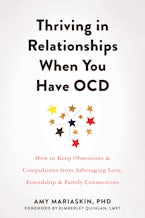As a therapist, you’ve likely encountered this scenario: a worried client asks a question repeatedly in a futile attempt to assuage their anxiety. You find yourself caught between the urge to provide them with the answer they crave, and the knowledge that answering this question is likely to increase rather than reduce their distress.
While checking in with others for reassurance is a natural part of relationships, it becomes unhelpful when questions are directed toward a non-credible source (e.g., asking a therapist if a mole is cancer), when questions are asked seeking a particular response, or when answers are persistently doubted. In these cases, providing excessive reassurance reinforces the cycle of anxiety. So, how do you respond to these questions when a client is clearly in distress?
Step 1: Validate the emotion behind the question. It’s likely that your client is feeling anxious and overwhelmed, and letting them know that you see this can help to create trust.
Step 2: Name the process. Acknowledge the pattern of repeatedly asking the same question and let them know that although getting an answer may feel good in the moment, it’s unlikely to quell their anxiety over time.
Step 3: Let them know with compassion that you are going to refrain from answering the question. See if they are willing to shift gears without getting their question resolved, or if they can come up with a “good enough” answer to the question themselves. If this is difficult, you can offer that you delay answering the question or only answer the question partially.
This might look like saying, “This is the third time you’ve asked if it’s okay that you were late today. I see that you’re feeling pretty anxious about it and that getting an answer feels urgent. I want to do what’s best for you, so I’d like us to experiment with how it feels for me not to answer that question, especially since I’ve responded already. Are you willing to see how that feels?” Over time you may shorten this to “asked and answered,” or an irreverent “maybe you’ll never know!”
Amy Mariaskin, PhD, is a licensed clinical psychologist with fifteen years of experience treating obsessive-compulsive disorder (OCD), anxiety, and related disorders. She is founding director of the Nashville OCD & Anxiety Treatment Center, faculty of the International OCD Foundation’s Behavior Therapy Training Institute, and adjunct professor at Vanderbilt University. Mariaskin has provided individual and group therapy to adults, adolescents, children, and families affected by these disorders. She strives to create a sensitive and affirming therapeutic experience for her clients, and incorporates humor and creativity into evidence-based practice.



